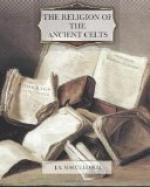“I invoke the land of Ireland!
Shining, shining sea!
Fertile, fertile mountain!
Wooded vale!
Abundant river, abundant in waters!
Fish abounding lake!
Fish abounding sea!
Fertile earth!
Irruption of fish! Fish there!
Bird under wave! Great fish!
Crab hole! Irruption of fish!
Fish abounding sea!"[559]
A similar formula was spoken after the destruction of Da Derga’s Hostel by MacCecht on his finding water. He bathed in it and sang—
“Cold fountain! Surface of
strand ...
Sea of lake, water of Gara, stream
of river;
High spring well; cold fountain!"[560]
The goddess Morrigan, after the defeat of the Fomorians, invokes the powers of nature and proclaims the victory to “the royal mountains of Ireland, to its chief waters, and its river mouths."[561] It was also customary to take oaths by the elements—heaven, earth, sun, fire, moon, sea, land, day, night, etc., and these punished the breaker of the oath.[562] Even the gods exacted such an oath of each other. Bres swore by sun, moon, sea, and land, to fulfil the engagement imposed on him by Lug.[563] The formulae survived into Christian times, and the faithful were forbidden to call the sun and moon gods or to swear by them, while in Breton folk-custom at the present day oaths by sun, moon, or earth, followed by punishment of the oath-breaker by the moon, are still in use.[564] These oaths had originated in a time when the elements themselves were thought to be divine, and similar adjurations were used by Greeks and Scandinavians.
While the greater objects of nature were worshipped for themselves alone, the Celts also peopled the earth with spirits, benevolent or malevolent, of rocks, hills, dales, forests, lakes, and streams,[565] and while greater divinities of growth had been evolved, they still believed in lesser spirits of vegetation, of the corn, and of fertility, connected, however, with these gods. Some of these still survive as fairies seen in meadows, woodlands, or streams, or as demoniac beings haunting lonely places. And even now, in French folk-belief, sun, moon, winds, etc., are regarded as actual personages. Sun and moon are husband and wife; the winds have wives; they are addressed by personal names and reverenced.[566] Some spirits may already have had a demoniac aspect in pagan times. The Tuatha Dea conjured up meisi, “spectral bodies that rise from the ground,”




